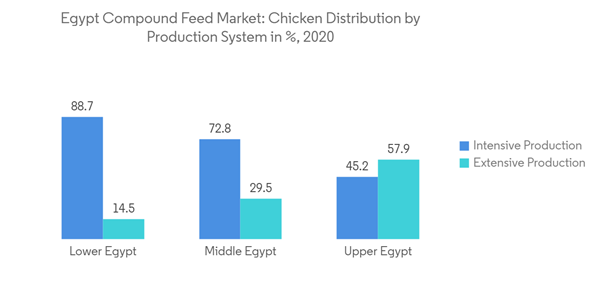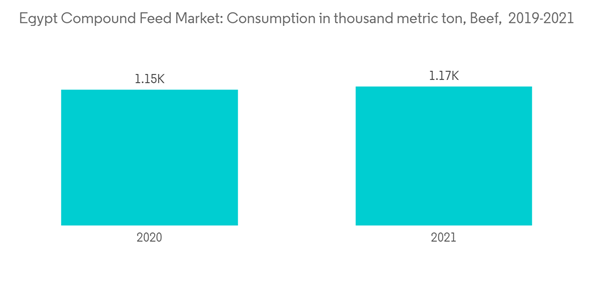Key Highlights
- The compound feed market is projected to experience brisk development due to a rise in animal-based food product consumption all over Egypt. Change in customer dietary habits toward the quality of dairy products and meat is expected to contribute to the growth of the compound feed market over the forecast period.
- In Egypt, the number of modern dairy and feed farms has increased considerably. As per USDA report in 2020, Dakahlia Poultry Co., one of Egypt's largest investors in the poultry sector, inaugurated a new feed mill with a capacity of 3.000 MT/ day of poultry feed and 400MT/ day of aquafeed. Egypt counts 180 poultry feed mills producing various types of feed formulations for the poultry industry; these supply over 95 percent of the domestic market's demand. The majority of the domestic meat consumed in the country is locally produced, making Egypt an attractive market for the supply and import of compound feed.
- Egypt is expected to rise ahead in manifold ways with respect to the agriculture and animal husbandry sectors. The government is currently emphasizing Egypt's Sustainable Development Strategy: Vision 2030, in which the livestock sector is anticipated to play a key role. Increasing the per capita animal protein consumption by 4g/day by the year 2030 is one of the main objectives of developing animal, poultry, and fisheries production. This has opened doors for a plethora of compound feed manufacturers in the region.
- The rising urbanization and increasing disposable incomes have directed the Egyptians toward the food habits of the Western world. This, in turn, has led to increasing demand for meat, meat products, and processed meat, thereby increasing the demand for compound feed in the country. Further, the changing raw material prices and stringent government policies and regulations related to domestic animal farming are presumed to have a negative impact on the compound feed industry in Egypt.
Egypt Compound Feed Market Trends
Growing Regulated Poultry Industry in Egypt
Poultry is one of the main agricultural industries in Egypt. It contributes 10% of agricultural value-added, with the country producing over 1 million ton of poultry meat. According to studies, the per capita consumption of poultry is approximately 15 kg per year. The sector is highly heterogeneous, comprising large integrated, specialized producers and at least 11 million households keeping chickens and other poultry. Stakeholders have identified two main poultry production systems in Egypt, intensive/commercial and extensive/household.As per the spotlight report on the livestock production system published by FAO and USAID, there are approximately 30,000 registered intensive poultry farms and the same number of unregistered farms. The majority, almost 80%, are located in Lower Egypt. The intensive poultry system is pivotal for the supply of affordably-priced animal protein to the Egyptian population. However, it is highly dependent on importing feed, mainly maize and soya bean, and other inputs and equipment, which makes consumer prices highly volatile.
Increased Beef Consumption
Egyptian beef consumption is driven by the availability of affordably priced beef. According to the USDA report, most Egyptian consumers are of the lower-income group. Egypt's meat-centric food culture remains unchanged, and any variation in the consumption rate is due to beef affordability. Beef consumption is fairly tied to cost rather than recommended daily protein intake.The Egyptian military and the Ministry of Supply and Internal Trade (MOSIT) are expanding their beef distribution channels, thus increasing the availability of affordably priced beef. Egyptians consume red meat from locally produced fresh beef, imported ready-for-slaughter cattle, imports of frozen buffalo meat from India, and frozen beef mainly from Brazil. More affluent consumers view frozen imported beef as being an inferior product. Their opinion is premised on the fact that the bulk of frozen imported beef is low-quality cuts sold at government outlets at discounted prices. Thus, the rising scale of urbanization due to changing consumer preferences in beef meat products and growing awareness of nutrient management are projected to boost the demand in the compound feed market in the coming years.
Egypt Compound Feed Industry Overview
The Egypt compound feed market is fragmented in nature, with major players such as Alltech, Cargill, Kent Nutrition Group, Land O'Lakes, and J.D. Heiskell & Co. These players account for most of the share in the compound feed market. Collectively, these companies are making significant investments to upgrade and expand their production plants in terms of capacity and technology for various products. These investments are being made in terms of mergers and acquisitions of small and regional players, providing technical support to small players, and expanding the R&D capabilities of the respective companies.Additional Benefits:
- The market estimate (ME) sheet in Excel format
- 3 months of analyst support
This product will be delivered within 2 business days.
Table of Contents
Companies Mentioned (Partial List)
A selection of companies mentioned in this report includes, but is not limited to:
- Archer Daniels Midland
- DeKalb Feeds
- Heiskell & Co.
- Kent Feeds
- Nutreco
- Cargill Inc.
- Land O Lakes Purina
- Alltech Inc.










